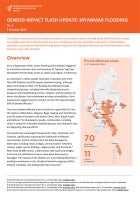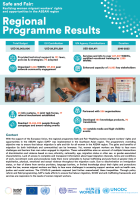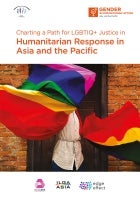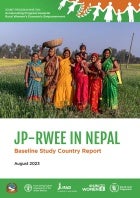Date:
Women and girls are at heightened risk of gender-based violence, trafficking, and exploitation—exacerbated by displacement, lack of safe shelter, and lack of access to protection services.
Date:
Over 17 million people have been affected, including 8.8 million women and girls. An estimated 4.8 million women and girls were living in the worst-affected areas.
Date:
The summary report outlines findings from the baseline study conducted to implement the Strategic Note 2023–2027, which guides the UN Women's work in Nepal. Divided into four outcomes, the report examines the current state of women's rights and gender equality
Date:
Even before the earthquake, more than a third of Myanmar’s people—including 10.4 million women and girls—needed urgent humanitarian aid. The earthquakes add another layer of hardship as they face unsafe conditions, disrupted health services, and heightened risks of gender-based violence and exploitation—especially for girls separated from their families.
Date:
This Gender-Impact Flash Update focuses on the gendered response to the flooding and draws on the experiences and insights from local organisations on the ground that are assessing and addressing the gender-specific needs emerging from this crisis.
Date:
This is the first Gender-Impact Flash Update on the flooding that has recently devastated parts of Myanmar. It was developed by the Gender in Humanitarian Action Working Group in Myanmar to provide insights into the specific impacts of the flooding on women and girls and their urgent needs.
Date:
With the support of the European Union, the regional programme Safe and Fair "Realizing women migrant workers’ rights and opportunities in the ASEAN region (SAF)" was implemented in the Southeast Asian region.
Date:
As in other regions, LGBTIQ+ communities in Asia and the Pacific are vulnerable to various forms of discrimination and violence, which are both similar to and distinct from other individuals and groups in humanitarian emergencies. These vulnerabilities stem from pre-existing inequalities, discrimination, and violence that are frequently exacerbated during crises, and are shaped by multiple intersecting factors.
Date:
The OGR, developed in Myanmar by the Gender in Humanitarian Action Working Group (co-led by UN Women and UNFPA) and in partnership with CARE, adapts CARE's Rapid Gender Analysis (RGA) toolkit to the challenges of collecting data in crisis settings.s
Date:
Drawing from the Inter-Agency Standing Committee (IASC) Gender in Humanitarian Action Handbook (https://www.gihahandbook.org) and incorporating insights from the Myanmar Gender in Humanitarian Action Profile, these localized checklists offer practical, sector-specific guidance.
Date:
These key findings will be used as the baseline for measuring the extent to which this programme will contribute to advancing gender equality and women’s empowerment in Nepal. The programme (second phase) is being jointly implemented by UN Women (lead), IFAD, FAO and WFP in close collaboration with all three tiers of governments.
Date:
This brief is guided by the UN Women-ILO Joint Programme tool, “How to Assess Fiscal Stimulus Packages from a Gender Equality Perspective” (hereafter called the ‘gender assessment tool’) and is part of a larger assessment of Nepal’s macroeconomic policy response to the COVID-19 pandemic.
Date:
This brief, which is an outcome of the UN Women-ILO Joint Programme, argues that macroeconomic policies play a key role in promoting the distribution of income and access to decent work opportunities for women. Investments in care services allow for the redistribution and reduction of unpaid care work and address time poverty
Date:
Key insights highlight how disasters amplify gender-based violence, and livelihood challenges, and hinder access to essential services. The document advocates for GEDSI-responsive planning, budgeting, and coordination within DRR frameworks, stressing the importance of inclusive approaches, stakeholder engagement, and robust monitoring for effective implementation.
Date:
This brief is developed to guide the development of injects for gender-responsive services/interventions for earthquakes and urban flood preparedness, describing disaster events, their impacts and response through a GESI perspective.
Date:
This policy brief addresses some of the key factors and measures to be adopted in a Post-Crisis GESI Analysis, to effectively address a crisis’s differential impacts on gender, social disability, and age. The recommendations are intended to support analyses undertaken immediately after a crisis, to represent structural inequalities...
Date:
This guideline has been developed to inform on its scope, procedure, implementation and reporting, under the technical guidance of UN Women Nepal, financial support from the European Union Humanitarian Aid and support from UNDP, UNICEF.
Date:
The Policy Brief draws from GEDSI Analysis conducted in Lumbini, Sudurpashchim and Karnali Provinces to identify opportunities for municipal governments and development partners to strengthen disaster risk reduction efforts and urban resilience by more comprehensively meeting the needs of women and excluded groups.
Date:
This is a brief of the highlights of Governance of Labour Migration in South and Southeast Asia (GOALS) which was jointly implemented by UN Women, ILO, and IOM with support from Swiss Development and Cooperation (SDC) from August 2020 to January 2024.
Date:
This brief explains key concepts related to gender-transformative approaches, accompanied by examples to support organizations in Myanmar to apply them more confidently in their Women, Peace, and Security (WPS) programming.

![[cover]](/sites/default/files/styles/search_image_140px/public/2025-04/mn-20250388119-myanmarearthquakegendersnapshot-01-960px.jpg?itok=gtt6hhfp)
![[cover]](/sites/default/files/styles/search_image_140px/public/2025-04/mn-20250388119-myanmarearthquakegenderimpact-flash-update-2-1-960px.jpg?itok=Bd4uX3ul)
![[cover]](/sites/default/files/styles/search_image_140px/public/2025-04/np-20250385755-baseline-study-report-07042025-website-960px.jpg?itok=VxHBLOYs)
![[cover]](/sites/default/files/styles/search_image_140px/public/2025-04/mn-giha-wg-gender-impact-flash-update-1_myanmar-earthquake-960px.jpg?itok=_N_r61T0)
![[cover]](/sites/default/files/styles/search_image_140px/public/2024-11/mn-c1269-giha-gender-impact-flood-update-no-2_nov-2024-960px.jpg?itok=-rSlqKRx)



![[cover]](/sites/default/files/styles/search_image_140px/public/2024-09/mn-c1109-myanmar-observational-gender-review-toolkit-675px.jpg?itok=rGY8hvvq)
![[cover]](/sites/default/files/styles/search_image_140px/public/2024-09/mn-c1108-myanmar-giha-toolkit-2024-960px.jpg?itok=jLDIhy0h)

![[cover]](/sites/default/files/styles/search_image_140px/public/2024-06/np-c961-policy-brief-tool-1-5-960px.jpg?itok=jMsLFzhi)
![[cover]](/sites/default/files/styles/search_image_140px/public/2024-06/np-c960-policy-brief-20230912-960px.jpg?itok=OJv8E8Ix)
![[cover]](/sites/default/files/styles/search_image_140px/public/2024-06/np-c949-05-gender-equality-disability-and-social-960px.jpg?itok=h06PBdVx)
![[cover]](/sites/default/files/styles/search_image_140px/public/2024-06/np-c948-04-gender-responsive-costing-for-earthquakes-960px.jpg?itok=mc9kJWZC)
![[cover]](/sites/default/files/styles/search_image_140px/public/2024-06/np-c947-03-unwomen-policy-brief-gedsi-post-crisis-202-960px.jpg?itok=G_7Qks6P)
![[cover]](/sites/default/files/styles/search_image_140px/public/2024-06/np-c946-02-gedsi-responsive-drr-audit-guidline-2080-960px.jpg?itok=zzicLbBB)
![[cover]](/sites/default/files/styles/search_image_140px/public/2024-06/bd-c945-1-policy-brief-gedsi-linking-drrm-20-en-960px.jpg?itok=kTtTG-oO)
![[cover]](/sites/default/files/styles/search_image_140px/public/2024-05/bd-c899-goals-highlights-960px.jpg?itok=3Ih8ksJA)
![[cover]](/sites/default/files/styles/search_image_140px/public/2024-04/mn-c825-myanmar-wps-brief2-cover-960px.jpg?itok=g1-XuFHP)